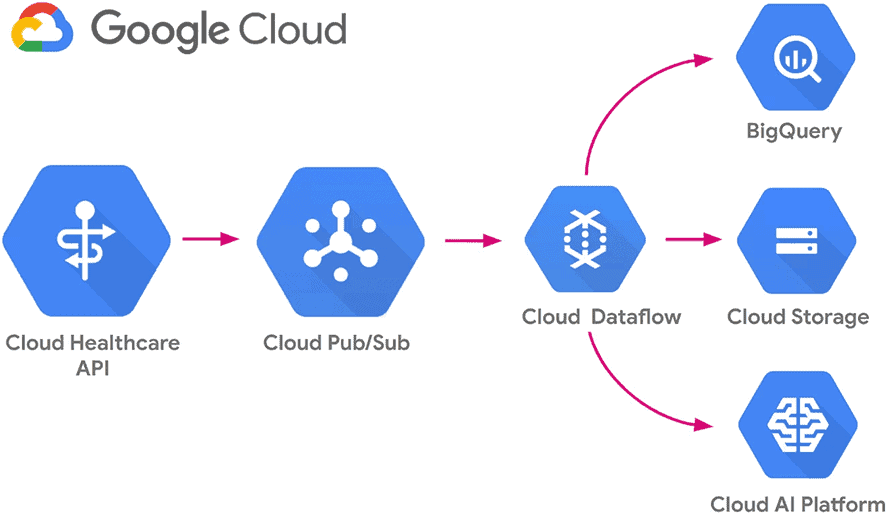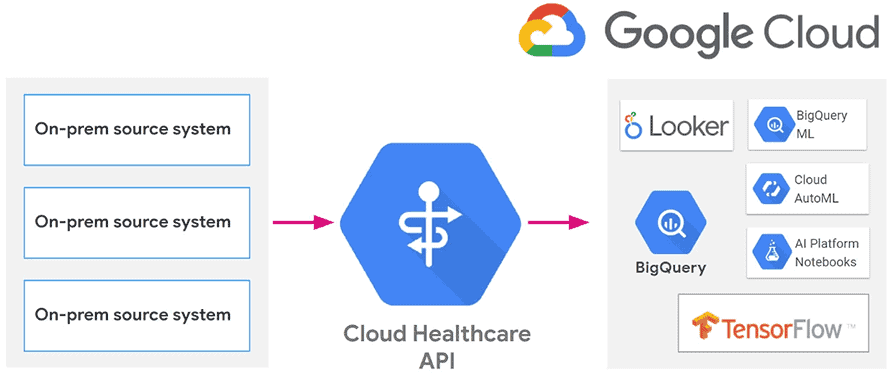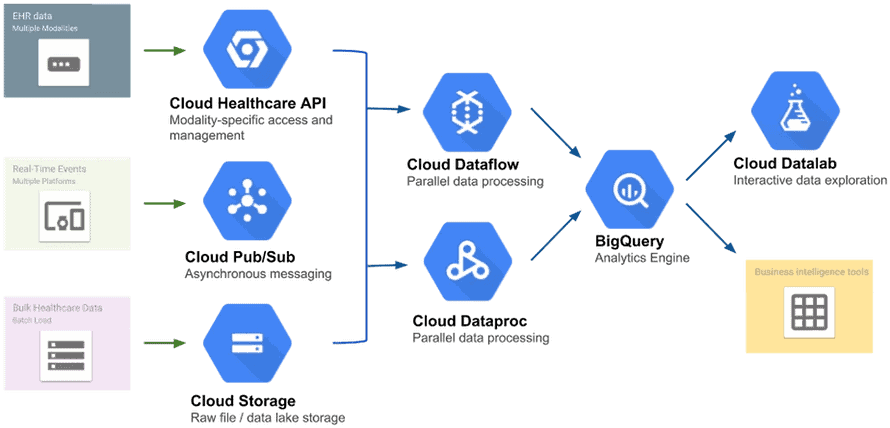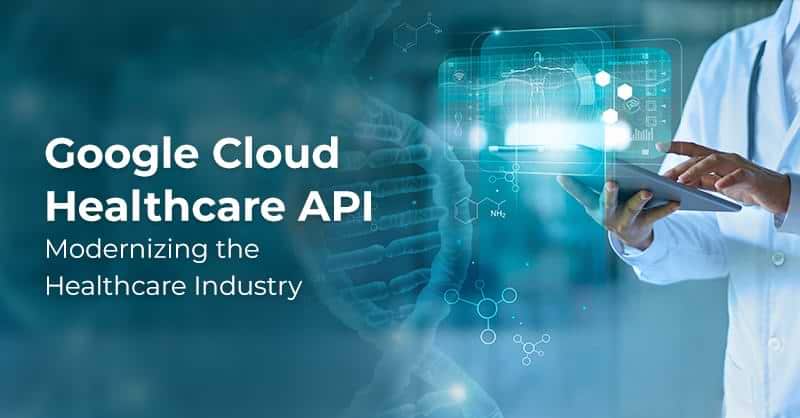Google Cloud Healthcare API: Modernizing the Healthcare Industry

Written by Nikhil Dutt
Cloud Data Engineer
November 11, 2022
The healthcare industry is undergoing a dramatic transition in how it can access, share, and process patients’ data. With the increased availability of genomic information and artificial intelligence (AI), many have begun to rely on high-performance computing (HPC), to offer better care services. The use of cloud technology to store and process massive amounts of data has also emerged as an important factor in this revolution. When the pandemic hit, the requirement for faster computation and more storage capabilities became a necessity within the healthcare industry, especially pharma and insurance. It is this advanced computational infrastructure that is today dubbed “Industry 4.0” aka the 4th Industrial Revolution. In this blog, we will be discussing how Industry 4.0 capabilities, and companies today can offer better care for patients thus improving overall health.
What is the Role of API in Healthcare?
What is API in Healthcare?
Simply put, healthcare APIs are created to enable data transfer across different information systems. With the introduction of EHR (Electronic Health Records), it has become necessary to ensure that this data can spread across the different healthcare system elements seamlessly. From helping health insurance organizations to communicate with hospitals about billing to helping providers select the right care and drugs. This is where specialized APIs come in offering interoperability while maintaining strict levels of data privacy. According to a recent report, over the 10 years (2022-2032), healthcare APIs are projected to grow at a CAGR of 3.6% and are estimated to be worth $306 million by 2032.
Types of Healthcare APIs:
There are several types of healthcare APIs depending on the area of focus: patient data APIs, diagnosis APIs, telehealth APIs, data analytics APIs, etc. For instance, Human API by AWS collects data from different health systems and converts it to FHIR format, while the Mayo Clinic API is used for symptom checking. Google Cloud Healthcare API with its ability to work across multiple data standards, helps manage the data and analyze it with advanced tools and services like BigQuery and Vertex AI while maintaining HIPAA compliance and other healthcare data privacy standards.
What are the Challenges of Healthcare API?
The top three challenges Healthcare APIs face: Security, Compliance, and Interoperability.
- Security: Healthcare data is the most sensitive type of data as it contains PII data (like SSN, DOB, phone number, address, etc). Thus, avoiding data leakages using a secured API environment is a crucial concern. In 2021, 64% of organizations suffered from ransomware attacks, representing a 94% increase in a single year.
- Compliance:Complying with HIPAA rules regarding health and medical information is a must for all healthcare entities, failing which, attracts severe penalties. Healthcare APIs must comply with HIPAA rules as it deals with electronically protected health information (ePHI) Some ePHIs include:
- Personal Health Plan
- Name
- Medical records
- IP Address
- Fingerprints or Voiceprints
- Name
- Medical records
- IP Address
- Fingerprints or Voiceprints
- Personal Health Plan
Healthcare Interoperability: The Final Hurdle for Healthcare APIs
Finally, the major hurdle healthcare APIs face that we believe Google Cloud Healthcare API successfully tackles is:
- Interoperability:This term refers to a system that can transfer medical data and other health-related records from different care systems or providers to another. Interoperability is crucial in healthcare as it:
- Improves care coordination: Healthcare providers get easy access to patient data, helping them provide a better level of treatment and care services, as it reduces miscommunication and repeat tests.
- Data-enhanced treatment: Organizations can conduct analysis, to create a data trend dashboard and drug response of the patient which helps to improve patient care services and overall treatment.
- Better patient experience: From drug prescriptions to insurance claims; numerous bureaucratic hurdles that healthcare providers and patients need to overcome should reduce.
Achieving healthcare interoperability is not an easy task as various EHR providers use different vocabularies and different programming languages. In 2021, the national coordinator’s office for health information technology reported that 73% of hospitals surveyed indicated that they have faced challenges in exchanging patients’ data from different vendor platforms. APIs can’t singlehandedly solve the problem of interoperability. Yet, a set of standards and regulations have been developed to improve the connection between EHR and APIs. All key players in healthcare in the US have to adhere to:
- The 4th version of Fast Healthcare Interoperability Resources from HL7 International (FHIR).
- US Core Data for Interoperability (USCDI).
GCP Healthcare API comprises three modality-specific interfaces that implement key industry-wide standards for patients’ data, thus eliminating many issues that plague most healthcare APIs:
- FHIR: An emerging standard for health data interchange
- LH7v2: The most widely adopted method for health systems integration
- DICOM: The dominant standard for radiology and imaging-related disciplines
How Cloud Healthcare API Impacts the Pharma Industry:
An Introduction to Google Cloud Healthcare API
Google Cloud Healthcare API which was launched in 2020, was in direct response to the strain on health systems due to the coronavirus pandemic. By supporting health data standards like FHIR, DICOM, and HL7, this API provides a single touchpoint for all data exchange across various care systems and provides access to analytics and AI/ML capabilities like BigQuery and Vertex AI. This API allows companies to accelerate their process of developing advanced care services while maintaining HIPAA compliance.

Results of Using GCP in the Healthcare Industry
- Reduces complexity of APIs offered through microservices
- Provides security features to help protect the transmission of health data
- Delivers API calls average response time of fewer than 0.5 seconds
- Accelerates genomic sequence processing with TPUs
- Reduces deep learning model training from hours to minutes with TensorFlow
- Protects genomic data by controlling privacy, daily use, data access, sharing, and permissions.
- The solution scales to meet spikes in demand for data processing and storage

Google Cloud API for health provides the latest technology alternatives to legacy tech stacks implementing DICOM, FHIR, or HL7v2 standards, which simplifies data integration with existing systems, in turn helping the application developers to focus on other features like artificial intelligence and UI/UX.
What Can a Developer Expect From Cloud Healthcare API?
With Google Cloud’s API for healthcare, there are several advantages for developers seeking to connect current technologies to next-gen healthcare applications and systems.
- Standards conformance: Google supports the use of standards-based interoperability through its participation in several healthcare standards including FHIR and DICOM. In future updates, we expect to support additional versions of these specifications as well as the ability to request a resource in a different version than its canonical representation.
- Compliance with privacy regulations: GCP provides detailed guidance regarding how it supports compliance with HIPAA in the US, the PIPEDA in Canada, and other global privacy standards at cloud.google.com/security/compliance.
- Data location control: The Cloud Healthcare API treats data location as a core component of the API. You have the option to select the storage location for each dataset from a list of currently available locations which correspond with GCP’s regional structure.
- Security: The Cloud Healthcare API security model is based on Google’s Identity and Access Management (IAM) system. IAM’s fine-grained permissions give you complete control over access to your healthcare data. In addition, we’ve created open-source proxies for the Apigee API Management system, which provides comprehensive threat detection and traffic management capabilities that allow you to securely expose sensitive ePHI with patient and provider applications.
- Bulk import and export: The Cloud Healthcare API’s DICOM and FHIR modalities support bulk import and export of data, making it easier to transfer data via the Cloud Storage system.
- De-identification: De-identification support for DICOM is available, making it much easier to redact patient information from studies for research and other purposes. The de-identification process operates on a data store basis.
- Auditability: Both administrative and data access requests to the Cloud Healthcare API can be audited. Logs are available through Google Cloud’s Stackdriver hybrid monitoring system.
- High availability: Availability for mission-critical scenarios is made possible through Google Cloud’s robust and highly redundant infrastructure.

Cloud Healthcare API Services: Vaccine Supply, Distribution, and Delivery
During the pandemic, with the exponential increase in demand for new vaccination, pharmaceuticals required advanced computation that could deal with a vast number of variables. Previously, this data was handled in on-prem servers, but due to high demand, the pharma industry started to rely on cloud computing platforms like GCP, which can handle this kind of data with high-performance GPUs and TPUs. The computation time required was reduced from days to hours and minutes, which was a definite value add for the development of a vaccine. Additionally, for mass production, many new robotic technologies were adopted, and this robotic automation was managed using Google Cloud Healthcare API and GCP tools like Vertex AI.
Following that, the next step was effective vaccine administration. For instance, Arizona’s Department of Health Services faced the challenge of vaccinating its 4 million citizens. By partnering with GCP and utilizing Cloud Healthcare API they were able to build a centralized solution through which citizens could easily schedule and systematically receive the vaccine, this, in turn, helped the Department of Health Services to effectively manage and monitor the vaccine administration process.
How Royal Cyber Can Help:
Google Cloud Platform offers a suite of solutions to tackle challenges within the healthcare industry. These cloud products help improve productivity, and efficiency, and maintain patient confidentiality. Healthcare companies can now use Google Cloud to build a platform for the future of the industry. Royal Cyber is the best choice for implementing Google Cloud Healthcare API in a HIPAA-compliant manner because we have a team of data professionals who can help healthcare companies achieve success in their digitization efforts. So whether you are a pharmaceutical company in search of AI and big data capabilities to drive drug production or a health insurance firm seeking more efficient ways of processing patients’ claims for care services, we have the experts to help you implement this solution successfully- be it GCP managed services or GCP consulting services.
For more information visit our website www.royalcyber.com or email us at [email protected].
Recent Blogs
- An Insight into ServiceNow Hardware Asset Management (HAM) Ramya Priya Balasubramanian Practice Head ServiceNow Gain …Read More »
- Learn to write effective test cases. Master best practices, templates, and tips to enhance software …Read More »
- In today’s fast-paced digital landscape, seamless data integration is crucial for businessRead More »






